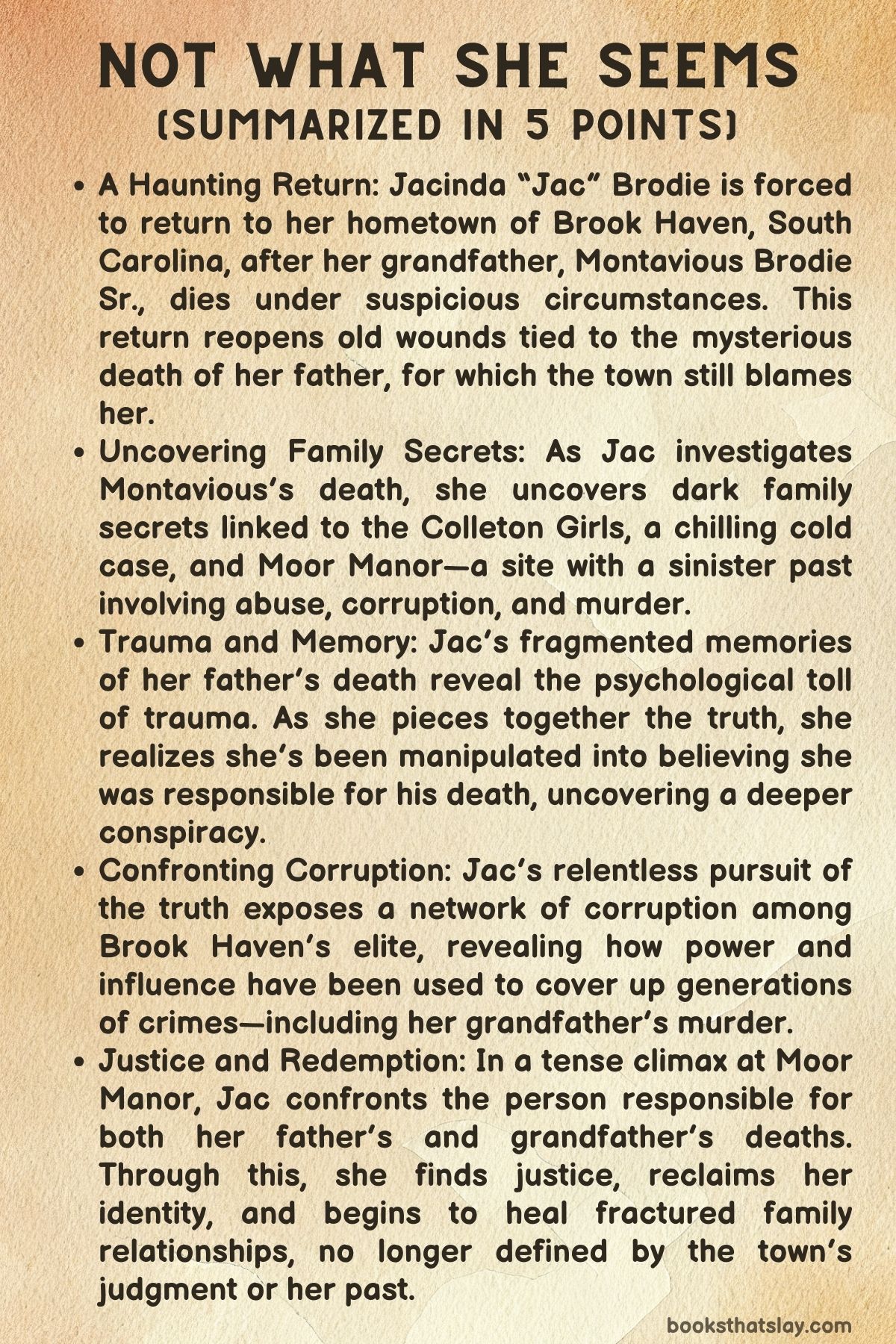Not What She Seems by Yasmin Angoe Summary, Characters and Themes
Not What She Seems by Yasmin Angoe is a gripping psychological thriller that delves into the tangled web of family secrets, betrayal, and the haunting shadows of the past.
The story follows Jacinda “Jac” Brodie, who is forced to return to her small, gossipy hometown of Brook Haven, South Carolina, after her grandfather’s sudden death. What begins as an emotional homecoming quickly spirals into a dark investigation that reopens the wounds of her traumatic past. As Jac digs deeper, she uncovers a sinister conspiracy tied to her family’s history, challenging her perception of truth, identity, and justice.
Summary
Jacinda “Jac” Brodie thought she’d left the ghosts of her past behind when she fled Brook Haven, South Carolina, six years ago. Branded the town’s pariah after the suspicious death of her father, Chief Linwood Brodie—a tragedy many believed she caused—Jac built a new life in Washington, D.C.
But her fragile stability shatters when she receives a call that her beloved grandfather, Montavious Brodie Sr., has died suddenly from what appears to be a heart attack. Despite her reluctance, Jac returns to Brook Haven, driven by grief and an uneasy feeling that her grandfather’s death isn’t as natural as it seems.
Montavious, a retired detective with a sharp mind and an insatiable curiosity, had been investigating an old cold case before his death. Jac quickly discovers that he was obsessed with uncovering the truth about the Colleton Girls, a shadowy piece of local history tied to the infamous Moor Manor.
The Manor, perched ominously on a cliffside, has a dark legacy—once a Civil War hospital, then a mental institution marked by abuse, and now a quaint country inn run by a charismatic newcomer named Faye Arden. Something about Faye feels off to Jac, especially when she finds one of Montavious’s prized possessions hidden in Faye’s office. The coincidence is too much to ignore.
Jac’s investigation is complicated by the strained relationships she left behind. Her mother, Angela, is cold and distant, their connection fractured by years of silence and mutual blame.
Her younger sister, Penelope (Pen), is more open but carries her own resentment over Jac’s abrupt departure years ago. These family dynamics add emotional weight to Jac’s already turbulent return, forcing her to confront not just external mysteries but also the painful echoes of her fractured family.
While Jac searches for answers, she’s haunted by fragmented memories of the night her father died.
Trauma has blurred the details—shadows of a heated argument, fear, and the image of her father’s body falling from Moor Bluff into the river below. The guilt she’s carried all these years is a heavy burden, one that’s shaped her identity and decisions. But as Jac digs deeper, she realizes her past and her grandfather’s death are inextricably linked.
Her investigation uncovers a tangled web of corruption among Brook Haven’s elite, people who will do anything to keep the town’s darkest secrets buried. Montavious had gotten too close to the truth, and his death was no accident.
The Colleton Girls case, once dismissed as local folklore, reveals connections to systemic abuse, powerful families, and a conspiracy that spans generations. Jac’s relentless pursuit of justice puts her squarely in the crosshairs of those who’d rather see her silenced—just like her grandfather.
As Jac unearths the truth, her repressed memories start to resurface. She remembers the full events of the night her father died: he was abusive, and their final confrontation escalated beyond control.
But Jac wasn’t responsible for his death. Someone else was there that night, someone who manipulated the situation to make her believe she was to blame. This revelation is both devastating and liberating, forcing Jac to reconcile with the guilt she’s carried for years.
The story reaches its harrowing climax at Moor Manor, where Jac confronts the person responsible not just for Montavious’s murder but also for her father’s death.
The final showdown is a collision of past and present, truth and deception. It’s a raw, emotional battle where Jac must face her deepest fears to fight for justice—not just for her family, but for herself.
In the aftermath, Jac stays in Brook Haven longer than planned. She begins to repair her fractured relationships with her mother and sister, finding a fragile sense of peace. While the town’s whispers may never fully fade, Jac no longer defines herself by them.
She reclaims her narrative, deciding to write her own story—an act of catharsis and empowerment. Through her journey, Jac transforms from a woman haunted by her past into one who confronts it head-on, emerging stronger, wiser, and unafraid to face the truth.

Characters
Jacinda “Jac” Brodie
Jacinda “Jac” Brodie is the central character of Not What She Seems, and her journey is one of confronting her painful past and reclaiming control over her life. She returns to her hometown of Brook Haven, South Carolina, after the sudden death of her grandfather, Montavious Brodie.
Jac had fled the town six years ago after being accused of her father’s death, a trauma that has lingered over her since. Throughout the novel, Jac is portrayed as a deeply conflicted character: intelligent, determined, and independent, yet haunted by guilt and unresolved grief.
Her return to Brook Haven forces her to face not only her family’s complex dynamics but also the dark secrets that have shaped her life. Jac’s fragmented memories of her father’s death and her grandfather’s suspicious passing serve as pivotal elements in her investigation, ultimately leading her to uncover the truth about both events.
As Jac confronts these painful memories, her character evolves from a woman burdened by the past into someone who finds strength and resolution through self-discovery and justice.
Montavious Brodie Sr.
Montavious Brodie Sr., Jac’s grandfather, plays a key role in the unfolding mystery. A retired detective turned amateur sleuth, Montavious is described as sharp and resourceful, with a deep-seated commitment to uncovering the truth.
His death, initially thought to be from a heart attack, is revealed to have been a murder linked to his investigation into the cold case of the Colleton Girls. Montavious’s investigative work connects several pivotal plot points, particularly the discovery of the dark history tied to Moor Manor and the town’s elite families.
Despite his death, Montavious’s presence looms large throughout the story, driving Jac’s quest for answers and providing the catalyst for her return to Brook Haven. His death exposes the corrupt and dangerous forces in the town, and his legacy pushes Jac to confront her own past while uncovering the hidden truths about her family and the town’s dark secrets.
Chief Linwood Brodie
Chief Linwood Brodie, Jac’s father, is a crucial figure whose mysterious death serves as one of the primary sources of Jac’s trauma. His tragic fall from Moor Bluff, under circumstances that led to town rumors about Jac’s involvement, hangs over Jac throughout the novel.
For years, Jac believed that she might have been responsible for his death, and this belief caused her to flee Brook Haven. As the story unfolds, Jac comes to terms with the fact that her father’s abusive nature played a role in his demise and that his death was not her fault.
Through the revelations about her father’s behavior and the events leading up to his death, the reader gains insight into the emotional and psychological weight Jac has carried for years. Chief Brodie’s legacy of abuse and the role it played in Jac’s troubled relationship with her family becomes an integral part of Jac’s quest for self-knowledge and redemption.
Faye Arden
Faye Arden is the wealthy newcomer to Brook Haven who purchases Moor Manor and turns it into a country inn. Faye appears to be the picture of elegance and charm, drawing the admiration of the townspeople.
However, Jac is immediately suspicious of Faye and believes that there is something sinister beneath her polished exterior. As Jac investigates further, she discovers that Faye is linked to the dark history of the Manor and the conspiracy surrounding the Colleton Girls.
Faye’s role in the story is that of an enigmatic antagonist whose true motives are slowly revealed. She embodies the theme of appearance versus reality, as her outwardly perfect life conceals her involvement in the town’s more nefarious dealings.
Faye’s actions ultimately lead to a showdown with Jac, where the full extent of her involvement in the deaths of both Montavious and Jac’s father is revealed.
Angela Brodie
Angela Brodie is Jac’s mother, and their relationship is strained and emotionally fraught. Angela’s cold demeanor and her apparent reluctance to confront the past add complexity to Jac’s return home.
Throughout the novel, Angela serves as a reminder of the family dynamics that Jac fled from, and their interactions highlight the unresolved tensions between them. Angela’s failure to provide emotional support to Jac after her father’s death leaves Jac feeling abandoned and misunderstood.
As Jac delves into her investigation, she begins to understand that her mother’s silence and emotional distance are rooted in her own trauma. By the end of the novel, Jac begins to repair her relationship with Angela, though it is clear that their bond will never fully heal.
Angela’s character arc represents the ways in which trauma can shape family relationships and how, despite the scars of the past, there is potential for reconciliation and understanding.
Penelope “Pen” Brodie
Penelope, Jac’s younger sister, is another key figure in Jac’s return to Brook Haven. Pen has a more open and empathetic relationship with Jac compared to their mother, though she too harbors her own feelings of resentment.
Pen’s character is one of emotional depth, as she struggles with the shadow of their father’s legacy and the town’s judgment of Jac. While Pen is more willing to listen to Jac and support her, she is also deeply affected by the family’s history.
Pen’s role in the narrative is that of a grounding force, someone who provides emotional support to Jac while also helping her navigate the tensions within the family. Over the course of the story, Pen’s growth mirrors Jac’s, as both women are forced to confront their shared history and reconcile their differences.
Pen’s character represents the younger generation’s ability to heal from the trauma inflicted by their predecessors.
Conrad Meckleson
Conrad Meckleson is Jac’s former lover and mentor, and his betrayal serves as a catalyst for Jac’s journey. Conrad is a manipulative and self-serving individual who sabotages Jac’s career in academia by stealing her personal trauma and using it as the basis for a best-selling novel.
His actions not only destroy Jac’s professional life but also add to the emotional burden she carries. The confrontation between Jac and Conrad is a pivotal moment in the novel, as it highlights themes of betrayal, exploitation, and the struggle for control over one’s own narrative.
Conrad’s role in the story is that of an antagonist who uses Jac’s vulnerability for his own gain, further complicating her sense of self-worth and trust in others. However, Jac’s exposure of his deceit marks a turning point in her personal journey, as she reclaims her story and her agency.
Themes
The Unraveling of Hidden Truths and Their Impact on Identity
At the heart of Not What She Seems is the exploration of deep family secrets and how they shape both the present and future of those involved. The Brodie family has been carrying these burdens for generations, with Jacinda “Jac” Brodie at the center of this legacy.
Her return to Brook Haven brings to light the shocking reality of her family’s past, filled with suppressed truths, trauma, and betrayal. Jac’s journey is not just about uncovering what happened to her father and grandfather, but also about understanding how these events, once concealed, have shaped her perception of herself and her relationships.
The tension between honoring family loyalty and seeking justice for the wrongs committed against her is a constant battle Jac faces. Her family’s dark history isn’t merely a backdrop; it plays a pivotal role in how she views her identity and her actions as she unearths long-buried truths.
Repressed Memories and the Battle for Self-Understanding Amidst Trauma
Jac’s fragmented memories of her father’s death and her own painful experiences reveal a central theme of how trauma distorts reality. Trauma is not simply an emotional wound; it is a lens through which Jac perceives the world, making it hard for her to distinguish between guilt and innocence.
For years, she believes she might have caused her father’s death, a perception that haunts her every decision. The complexities of repressed memories play a significant role in the narrative, showing how trauma can cloud one’s judgment, even to the point of self-deception.
Jac’s fractured recollections reveal the long-lasting effects of emotional scars, not just on memory but on how trauma can manipulate one’s identity. As Jac unravels the truth, she must confront the uncomfortable reality of how deeply this psychological wound has impacted her self-worth, her family dynamics, and her perception of her own actions.
The Intergenerational Cycle of Abuse and its Roots in Power Dynamics within Small-Town Politics
The narrative delves into the darker aspects of power dynamics, particularly the insidious role of generational abuse and how it weaves through the fabric of Brook Haven’s small-town politics. The Colleton Girls’ connection to the Moor Manor symbolizes this cycle of power abuse and exploitation, where systemic corruption thrives.
Jac’s grandfather, Montavious Brodie, digs into a case that reveals the abuses buried under the Manor’s history, touching on manipulation, exploitation, and even murder, perpetuated by the town’s influential families. The cycle of abuse extends to Jac herself, as she contends with the repercussions of her father’s abusive behavior and the town’s complicity in covering up the truth.
What begins as a family tragedy turns out to be a much larger conspiracy, with powerful figures using their position to bury crimes and maintain control. This theme reflects the idea that those in power—whether in families or society—often exploit their position to silence the vulnerable, and how these actions can have a lasting, damaging impact on future generations.
The Feminist Reclamation of Voice and Identity in the Face of Betrayal and Male Dominance
The theme of female empowerment runs deeply through Jac’s journey, particularly in her fight to reclaim her voice and identity after being silenced by betrayal and male dominance. The betrayal she experiences at the hands of her former lover, Conrad Meckleson, serves as a stark reminder of how women’s personal trauma is often exploited by those in power for their own gain.
Conrad’s theft of Jac’s story to write a bestselling novel is a clear manifestation of how women’s narratives are frequently co-opted by male figures in positions of authority. However, Jac’s decision to expose Conrad’s misconduct and steal back her manuscript represents her reclaiming control over her own life and story.
As she faces her past and uncovers the truths hidden by her family and town, Jac transforms from a victim of betrayal and manipulation into a woman who refuses to be defined by the men who sought to control her. This empowerment is not only central to her personal growth but also symbolically underscores a broader theme of reclaiming agency in a world that often seeks to undermine women’s voices.
The Liberation Through Truth and Confronting One’s Past
At its core, the novel is a profound exploration of justice and redemption, particularly as Jac seeks to right the wrongs done to her family while also reconciling with her past. Throughout the story, Jac grapples with feelings of guilt and shame, especially regarding the events surrounding her father’s death.
As she uncovers the truth about both her father’s death and her grandfather’s murder, Jac moves through a journey of self-redemption, learning that justice is not only about punishing wrongdoers but also about reconciling with one’s own actions and history.
The theme of justice goes beyond the surface of solving a crime; it becomes a personal journey of reclaiming agency, healing fractured relationships, and forgiving herself. In the end, Jac doesn’t just expose the town’s corruption—she redefines her relationship with her past and her family, finding a form of justice that liberates her from the shadows that once loomed over her.
This liberation allows her to reclaim not only her narrative but also a new sense of peace, one rooted in the truth rather than the lies that once defined her life.


